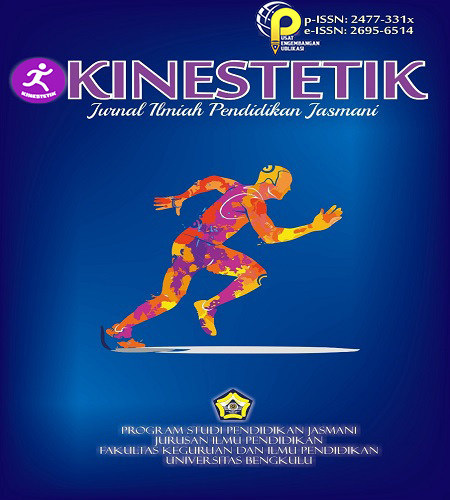Main Article Content
Abstract
This study aims to determine the impact of learning physical education (Penjas) on the formation of student character in social emotional learning. The ultimate goal of learning physical education is overall personality development, both physical, mental, emotional, social, and spiritual aspects. These aspects are carried out systematically, through participation in physical activity based on health and social norms (values, behavior, fair play, etc.). The method used in this study is an experimental method that will be carried out on UPI LabSchool Junior High School students. The instrument that will be used in this research is a social emotional competence instrument that will assess the student's character in terms of self-management, self-awareness, social awareness, relationship skills and responsible decision making. The data will be analyzed through inferential statistics using a comparison test of two averages. There are three outcomes in this research, including 1) Articles published in national journals, 2) Articles contained in international conference proceedings, 3) Intellectual Property Rights. There are two students involved in this research.
Keywords
Article Details
- Authors retain copyright and grant the journal right of first publication with the work simultaneously licensed under a Creative Commons Attribution-ShareAlike 4.0 (CC BY-SA) that allows others to share the work with an acknowledgement of the work's authorship and initial publication in this journal.
- Authors are able to enter into separate, additional contractual arrangements for the non-exclusive distribution of the journal's published version of the work (e.g., post it to an institutional repository or publish it in a book), with an acknowledgement of its initial publication in this journal.
- Authors are permitted and encouraged to post their work online (e.g., in institutional repositories or on their website) prior to and during the submission process, as it can lead to productive exchanges, as well as earlier and greater citation of published work (See The Effect of Open Access).
- This work is licensed under a Creative Commons Attribution-ShareAlike 4.0 International License.
References
- Abduljabar, B. (2008). Learning Management of Physical Education and Sports. Bandung: FPOK UPI Bandung.
- Arikunto, Suharsimi. (2002). The research procedure is a practical approach. Bandung: Rineka Cipta.
- Astuti, Y., & Mardius, A. (2017). Collaborative game development in physical education and sports in elementary schools to optimize character formation. Journal of Physical Education and Sport, 2(2), 79-86.
- Bailey, R., Armor, K., Kirk, D., Jess, M., Pickup, I., Sandford, R., & Education, BP (2009). The educational benefits claimed for physical education and school sport: an academic review. Research papers in education, 24(1), 1-27.
- Bahri, Syaiful. (2004). Parent and Child Communication Patterns in the Family. Jakarta : Rineka Cipta.
- Chaplin, James (2002). Complete Dictionary of Psychology. Jakarta: Rajawali Press. Indonesia Dictionary. Jakarta: Balai Pustaka.
- Ministry of Education. (2003). National Education Standards. Bandung: Focusmedia.
- Desmita. (2005). Developmental psychology. Bandung: PT Pemuda Rosdakarya.
- Lutan, Rusli. (2000). Physical Education Management. Jakarta: Ministry of National Education.
- Nazir, Moh. (2003). Research methods. Jakarta: Ghalia Indonesia.
- Nurhasan. (2002). Sports Education Tests and Measurements. Bandung: FPOK UPI Bandung.
- Purwanto. (2007). Social and Educational Research Instruments. Yogjakarta: Student Library.
- Riduwan. (2008). Easy Learning Research For Teachers, Employees and Beginner Researchers. Bandung: Alphabeta.
- Slamento. (2003). Learning and the Factors That Affect It. Jakarta: PT. Rineka Cipta.
- Sudjana. (2005). Statistical Methods. Bandung: Tarsito.
- Sugiyono. (2009). Qualitative Quantitative Research Methods and R&D. Bandung: Alphabeta.
- Surakhmad, Winarno. (2004). Introduction to Scientific Research. Bandung: Tarsito.
- Tarigan, Beltasar. (2005). Optimization of Physical Education and Sports Based on Sports Physiology. Bandung: FPOK UPI Bandung.
- Yusuf, Shamsu. (2004). Child and Adolescent Developmental Psychology. Bandung: PT Pemuda Rosdakarya.
- Kurniawan, F., & Karyono, TH (2010). Extra-Curricular as a Vehicle for Building Student Character in the School Education Environment. Free Journal: Jur. Pend. Training of the Faculty of Sports Science, Yogyakarta State University, 2(2), 1-17.
- Lee, TK, & Lee, HJ (2017). Effects of Sportscasting Model-based PE Classes on Creativity and Character. Korean Journal of Sport Science, 28(1), 185-203.
References
Abduljabar, B. (2008). Learning Management of Physical Education and Sports. Bandung: FPOK UPI Bandung.
Arikunto, Suharsimi. (2002). The research procedure is a practical approach. Bandung: Rineka Cipta.
Astuti, Y., & Mardius, A. (2017). Collaborative game development in physical education and sports in elementary schools to optimize character formation. Journal of Physical Education and Sport, 2(2), 79-86.
Bailey, R., Armor, K., Kirk, D., Jess, M., Pickup, I., Sandford, R., & Education, BP (2009). The educational benefits claimed for physical education and school sport: an academic review. Research papers in education, 24(1), 1-27.
Bahri, Syaiful. (2004). Parent and Child Communication Patterns in the Family. Jakarta : Rineka Cipta.
Chaplin, James (2002). Complete Dictionary of Psychology. Jakarta: Rajawali Press. Indonesia Dictionary. Jakarta: Balai Pustaka.
Ministry of Education. (2003). National Education Standards. Bandung: Focusmedia.
Desmita. (2005). Developmental psychology. Bandung: PT Pemuda Rosdakarya.
Lutan, Rusli. (2000). Physical Education Management. Jakarta: Ministry of National Education.
Nazir, Moh. (2003). Research methods. Jakarta: Ghalia Indonesia.
Nurhasan. (2002). Sports Education Tests and Measurements. Bandung: FPOK UPI Bandung.
Purwanto. (2007). Social and Educational Research Instruments. Yogjakarta: Student Library.
Riduwan. (2008). Easy Learning Research For Teachers, Employees and Beginner Researchers. Bandung: Alphabeta.
Slamento. (2003). Learning and the Factors That Affect It. Jakarta: PT. Rineka Cipta.
Sudjana. (2005). Statistical Methods. Bandung: Tarsito.
Sugiyono. (2009). Qualitative Quantitative Research Methods and R&D. Bandung: Alphabeta.
Surakhmad, Winarno. (2004). Introduction to Scientific Research. Bandung: Tarsito.
Tarigan, Beltasar. (2005). Optimization of Physical Education and Sports Based on Sports Physiology. Bandung: FPOK UPI Bandung.
Yusuf, Shamsu. (2004). Child and Adolescent Developmental Psychology. Bandung: PT Pemuda Rosdakarya.
Kurniawan, F., & Karyono, TH (2010). Extra-Curricular as a Vehicle for Building Student Character in the School Education Environment. Free Journal: Jur. Pend. Training of the Faculty of Sports Science, Yogyakarta State University, 2(2), 1-17.
Lee, TK, & Lee, HJ (2017). Effects of Sportscasting Model-based PE Classes on Creativity and Character. Korean Journal of Sport Science, 28(1), 185-203.
